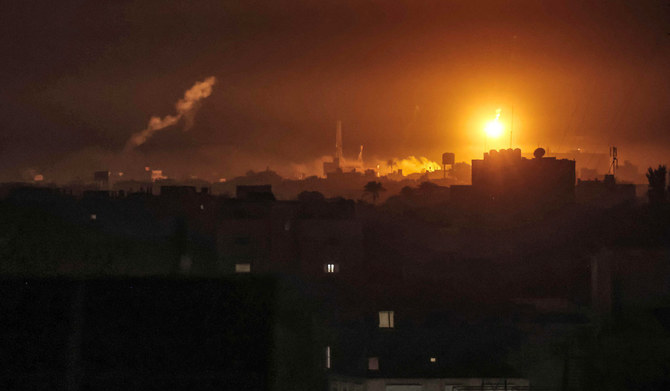
"I’m pretty sure they don’t have a realistic idea of how successful they would be against Hezbollah," Mann says
LONDON: Israel has miscalculated the costs of a potential new war with Hezbollah, a former US military intelligence analyst warned on Tuesday, noting that it could result in significant civilian casualties in both Lebanon and Israel.
Harrison Mann, a major in the Defense Intelligence Agency and the highest-ranking US military officer to resign over the Gaza conflict, expressed his concerns in an interview with The Guardian.
Mann underscored the high risk of Israel engaging in a war on its northern border for internal political reasons, primarily driven by Israeli Prime Minister Benjamin Netanyahu. Netanyahu’s hold on power and his insulation from corruption charges are seen as reliant on maintaining a state of war.
“I don’t know how realistic their assessments are of the destruction that Israel would incur, and I’m pretty sure they don’t have a realistic idea of how successful they would be against Hezbollah,” the former army officer and intelligence analyst said.
He said that the Israeli military was aware it could not decisively strike Hezbollah’s extensive arsenal, which is entrenched in the Lebanese mountains.
Instead, Mann suggested the IDF would target Hezbollah leaders and Shia residential areas to demoralize the group’s support base, a tactic referred to as the Dahiya doctrine, after the Beirut district was heavily bombed in the 2006 war.
“It’s not like an actual written doctrine, but I think we can be very comfortable assessing that bombing civilian centers as a way to compel the enemy is clearly an accepted and shared belief in the IDF and Israeli leadership. We’ve just seen them do it in Gaza for the past nine months,” Mann said, but he said that such a plan would backfire.
Mann told the Guardian that he expected Hezbollah would respond to any existential threat with a massive rocket and missile assault.
“They probably have the ability to at least partially overwhelm Israel’s air defenses, strike civilian infrastructure around the country, and inflict a level of destruction on Israel that I’m not sure Israel has really ever experienced in its history — certainly not in its recent history,” Mann said.
With Hezbollah’s arsenal seemingly out of reach from air strikes, Mann suggested that the IDF would initiate a ground offensive into southern Lebanon, which would come at a high cost in Israeli casualties.
He warned that sustained shelling of Israeli cities could compel the administration of US President Joe Biden, especially during an election period, to accede to Netanyahu’s calls for greater US involvement.
“Our least escalatory participation will be possibly striking supply lines or associated targets in Iraq and Syria to help cut off lines of communication and armaments flowing to Hezbollah,” Mann said. “But that on its own is risky, because if we start doing that, some of the people that we hit could be Hezbollah, but they could be IRGC (Iran’s Islamic Revolutionary Guard Corps).”
While Mann believes the Biden administration would aim to avoid direct conflict with Iran, he acknowledged that the risk of such an escalation remained.
“We know specifically that the Israeli prime minister must continue to be a wartime leader if he wants to prolong his political career and stay out of court, so that motivation is there,” Mann said, adding that any Israeli government would also be pressured by the displacement of tens of thousands of Israelis due to Hezbollah attacks.
Mann also pointed out the Israeli military establishment’s belief that the Iranian-backed Hezbollah must be confronted as it continues to grow in strength.
Mann’s resignation, submitted in November and effective from June, was accompanied by a public letter on LinkedIn in May. In the letter, he condemned US support for Israel’s actions in Gaza, stating it had “enabled and empowered the killing and starvation of tens of thousands of innocent Palestinians.”
As a descendant of European Jews, Mann wrote: “I was raised in a particularly unforgiving moral environment when it came to the topic of bearing responsibility for ethnic cleansing.”
He said that his resignation was met with a largely positive response from former colleagues, with many expressing similar sentiments.
“A lot of people I worked with reached out to me, a lot of people I didn’t work with as well, and expressed that they felt the same way,” he said. “It’s not just a generational thing. There’s quite senior people who feel the same way.”











